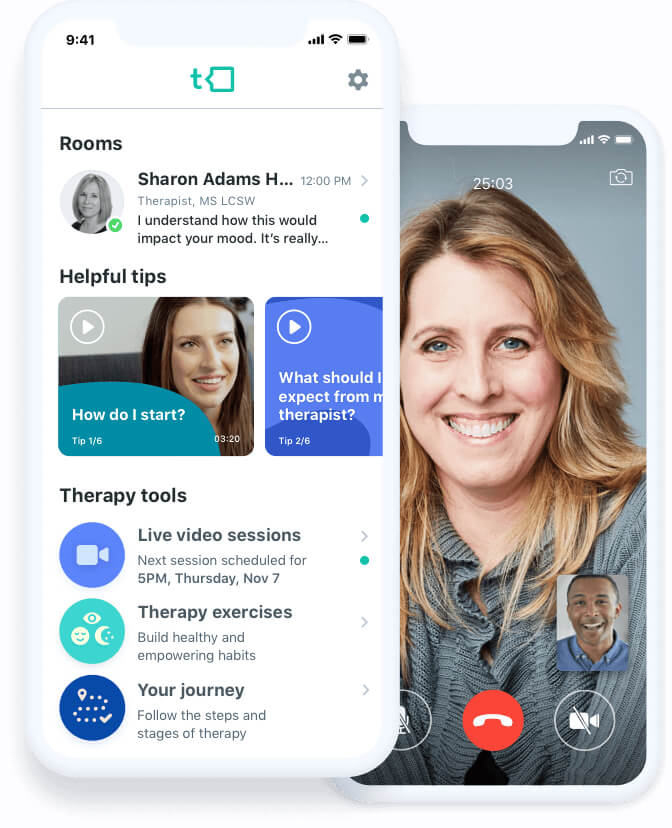
Postpartum Depression test
You are not alone

You deserve to feel better

Change starts with a single step

Talkspace is confidential, convenient, and affordable

Begin the postpartum depression test
Begin the postpartum depression test
FREQUENTLY ASKED QUESTIONS
What is postpartum depression?
Postpartum depression (PPD), sometimes referred to as postnatal depression, is a serious mental health condition characterized by severe depressive symptoms in mothers following the birth of a child, especially brought on by the psychological adjustments that accompany motherhood. PPD can develop during pregnancy or after giving birth; symptoms may arise after the first few weeks, months, or even up to a year after the birth of a child.
How is postpartum depression diagnosed?
Postpartum depression is diagnosed by a licensed mental health or medical professional. Your provider will talk to you about how you’ve been feeling and will likely have you complete a questionnaire to screen for postpartum depression. Your doctor may also order medical tests to rule out any underlying physical causes of your symptoms, such as an underactive thyroid.
What tests are used to diagnose postpartum depression?
The Edinburgh Postnatal Depression Scale and Postpartum Depression Screening Scale are common screening tools used to diagnose postpartum depression.
What causes postpartum depression?
While postpartum depression can impact any new mother, certain risk factors and common causes of PPD include:
- A difficult or traumatic delivery experience
- A family history of mental health concerns, including depression or anxiety
- External pressures due to financial stress or lack of support
Significant shifts in hormone levels following delivery
Can you self-diagnose postpartum depression?
Only a licensed mental health professional or physician can diagnose postpartum depression. If you frequently find yourself asking "do I have postpartum depression," doing research, but reading about postpartum depression and taking self-assessments can make you more aware of your symptoms.
How long does postpartum depression last?
Many people experience the “baby blues,” which typically goes away 1-2 weeks following the birth of the baby. Postpartum depression involves more intense symptoms that last for longer than two weeks. There is no specific timeline for how long postpartum depression may last. Without treatment, some can experience symptoms for a few weeks to several months or a year or more. The good news is that you can find relief from postpartum depression much sooner with treatments like therapy, antidepressants, and support groups.
How do you know if you’re experiencing postpartum depression symptoms?
Postpartum depression symptoms differ from the “baby blues” and often last longer than two weeks. Common symptoms of PPD include:
- Loss of interest in previously enjoyed activities (inability to find joy)
- Changed behaviors, especially in eating habits or sleep
- Increased anxiety, intrusive thoughts, or panic attacks
- Intense feelings and mood swings such as irritability, sadness, feeling guilty, or lack of a connection with your baby
If you or a loved one is experiencing these symptoms, taking our clinically-backed postpartum depression test acts as a helpful first step to gaining clarity and seeking treatment.
What does a PPD episode look like, and what can trigger postpartum rage?
Postpartum rage is characterized by the overwhelming anger a new mother might feel after the birth of a child, accompanied by feelings of shame and guilt. While PPD rage may be related to postpartum anxiety and depression, distinctive symptoms can include:
- Difficulty controlling your temper and feeling upset about things that normally wouldn’t bother you
- Screaming, swearing, or even physical expressions of anger
- Experiencing violent thoughts toward others
- Feeling flooded by emotion after an outburst
How do you treat postpartum depression?
Postpartum depression is a serious mental health condition that can be scary and distressing to go through. If you’re experiencing symptoms of PPD, it’s important to get help. Many new mothers feel alone in their emotions and delay reaching out for postpartum depression treatment.
Taking an online postpartum depression test can help you identify symptoms within yourself. Share these concerns with a mental health professional; they’ll work with you to develop a treatment plan that may consist of online therapy, medication, or lifestyle changes. Therapy is an effective tool for those dealing with postpartum depression, and for severe cases, in-person or online psychiatry may be used for the best results.
At Talkspace, we make the process easy by offering access to high-quality care from licensed mental health care providers anywhere at any time. As you explore your options, know that Talkspace is committed to making mental health care affordable by offering online therapy and psychiatry plans that take insurance.




